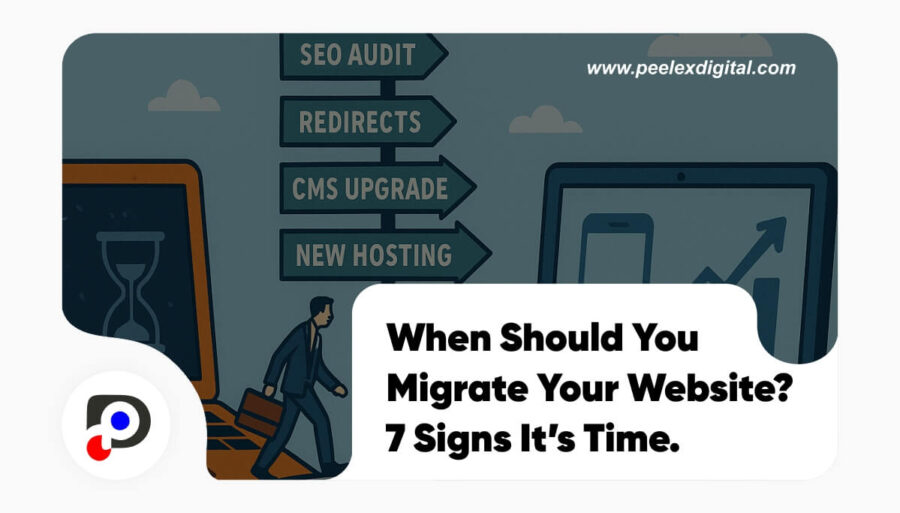If you’re wondering when to migrate your website, you’re not alone. Many business owners and webmasters delay migration until it’s too late when their traffic tanks, the site breaks down, or competitors outrank them. But strategic website migration can be the very move that takes your site from stagnation to growth.
In this article, we’ll explore seven unmistakable signs that it’s time to consider a website migration. We’ll also break down the common reasons for website migration and how to do it right, with no traffic loss or SEO damage.
Let’s dive in.
What Does Website Migration Really Mean?
Website migration refers to major changes made to a website’s structure, platform, domain, content, or design. It could be moving to a new CMS, switching hosts, redesigning the site, or restructuring URLs.
It’s like giving your digital storefront a new location or even a full renovation. And just like a physical move, doing it right requires planning, skill, and care.
When is the right time to migrate a website?
1. When Your Website is Slow or Outdated.
Is your site loading like it’s stuck in 2010? If your pages take longer than 3 seconds to load, you’re losing visitors and Google is noticing. Old themes, bulky plugins, unoptimized hosting, or outdated platforms can slow down your site and drag down your rankings. A website migration to a faster hosting environment or a modern CMS like WordPress, Webflow, or Shopify can give your visitors and SEO a much-needed boost.
Pro Tip: Use tools like Google PageSpeed Insights or GTmetrix to assess your current performance.
2. When Rebranding or Changing Your Domain Name
If your business has a rebranded name change, new logo, or new vision, your website should reflect that evolution. A domain name change often comes with this transformation. However, changing domains without proper 301 redirects can cause major SEO losses. A strategic migration helps you preserve your traffic, rankings, and backlink equity while ushering in your brand’s new era.
Our migration experts handle rebranding transitions without missing a beat.
3. You’re Switching to a New Content Management System (CMS)
Your current CMS might be holding you back. Whether it’s hard to use, lacks SEO features, or doesn’t support your business goals anymore, migrating to a more flexible CMS can be a game-changer.
Popular reasons for CMS migration include:
- Moving from Wix/Squarespace to WordPress for better SEO
- Migrating from Joomla or Drupal to a modern builder like Webflow
- Switching to Shopify for eCommerce scalability
This is one of the most common reasons for website migration and one of the most complex. But with the right team, it doesn’t have to be.
4. If Your Site Structure Is a Mess (Poor UX or SEO).
If your site is hard to navigate, has inconsistent URL structures, or lacks a logical hierarchy, it’s hurting both your users and your SEO.
A migration is your chance to restructure the site: improve URLs, reorganize content, set up proper redirects, and build a more intuitive experience for users and search engines alike.
Result: Better engagement, lower bounce rates, and improved crawlability.
5. If You’re Getting Penalized or Losing Traffic
Have your rankings dropped for no apparent reason? Seeing a dip in traffic even though you’re publishing content and building backlinks?
It might be due to technical SEO issues, crawl errors, or an outdated infrastructure. A website migration combined with a technical SEO audit can uncover hidden issues and give you a clean slate without starting from scratch.
This is where DIY migration can backfire. Work with pros who understand both tech and SEO.
6. If You’re Expanding to International Markets
Planning to go global? You’ll need a multilingual or region-specific version of your site.
Migrating to a CMS that supports hreflang tags, regional targeting, and scalable architecture is critical to making your international SEO strategy work.
Our team can help you structure your site for global visibility and user targeting.
7. If Your Hosting Provider Can’t Handle Your Growth
Is your site going down during traffic spikes? Are you hitting bandwidth or storage limits?
Upgrading to a more powerful hosting provider (like Kinsta, WP Engine, or Cloudways) often requires a site migration, but it’s one that pays off in speed, security, and scalability.
And don’t worry, we handle migrations without downtime, so your visitors (and revenue) never skip a beat.
How to Migrate Your Website Safely
Knowing when to migrate your website is only half the equation. Doing it the right way is what truly protects your traffic and SEO.
Here’s a high-level breakdown of how we handle it:
- Pre-migration audit (SEO, performance, structure).
- Backups of the current site and database.
- 1:1 URL mapping and 301 redirect planning.
- CMS and server setup.
- Migration execution (files, content, database).
- Testing, QA, and broken link checks.
- SEO re-indexing and Google Search Console updates.
- Post-migration monitoring.
Our website migration experts have successfully moved 100+ websites zero traffic loss, 100% peace of mind. Hier our website migration service.
Frequently Asked Questions About When To Migrate A Website.
What’s the difference between a redesign and a migration?
- A redesign focuses on visual changes (UI/UX), while a migration involves structural or technical shifts like domain changes, platform swaps, or URL restructuring.
Will migrating my site hurt my SEO?
- Not if done correctly. With proper 301 redirects, URL mapping, and post-migration SEO updates, your rankings can remain stable—or even improve.
How long does a website migration take?
- It depends on complexity, but most migrations can be completed in 3–10 days with proper planning.
Can I migrate my website myself?
- You can, but there’s a steep learning curve and risks involved (especially for SEO). Hiring professionals ensures you don’t lose traffic or break your site.
If any of the signs above sound familiar, it’s time to seriously consider a migration. The truth is, delaying a necessary migration often costs more in lost traffic, broken user experiences, and missed opportunities.
But when done strategically, a website migration can unlock new levels of speed, visibility, and performance.
Ready to migrate with zero headaches? Our expert team handles every step of the process from planning to redirects to post-launch SEO.
Let’s move your website the right way. Book your free migration consultation now.





